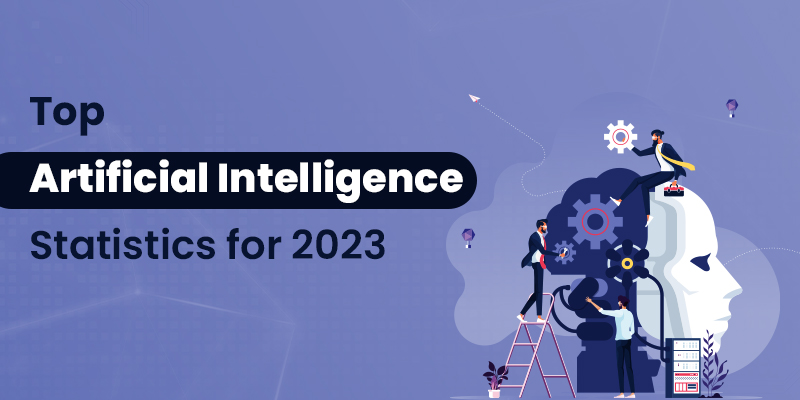Although enhancing human potential, digital life is causing disruptions in traditional human activity. Over the past 10 years, artificial intelligence (AI) has impacted every aspect of our culture and way of life. Its influence can be seen across a range of technologies, from self-driving cars and automated industrial machines to chatbots and virtual assistants like Siri and Alexa. If you are someone who wants to be a part of this wave, then make sure to enroll in Artificial Intelligence Certification. Before we go any further, have a look at the topics to be covered:
So let’s begin!
Read More: How Artificial Intelligence is Changing the Face of the Education Sector
Explore the Contents
- 1 What is Artificial Intelligence?
- 2 Top AI Trends for 2023
- 3 Top AI Statistics for 2023
- 3.1 Virtually All Smartphone Users Use AI Voice Assistants
- 3.2 Chatbots Have Already Taken Off
- 3.3 In just five years, the number of companies utilizing artificial intelligence increased by 300%.
- 3.4 AI Has the Potential to Increase Operating Profits in the Automotive Sector
- 3.5 By 2025, the AI sector will employ about 100 million people.
- 3.6 Leading Retailers Plan to Use AI in 2023 to Aid with Price Optimization
- 4 Future of Artificial Intelligence
What is Artificial Intelligence?
Modern computer innovation is built on AI, which helps automate processes and provide insights into massive datasets to generate value for both consumers and enterprises. Robots that can navigate a warehouse by themselves, cybersecurity systems that continuously assess and improve themselves, and virtual assistants who can comprehend what users are saying and take appropriate action are just a few of the many AI use cases that are emerging. A key component of artificial intelligence (AI) is machine learning (ML), which involves computers building models from training data in order to make predictions that are more accurate.
Artificial intelligence (AI) Types
The various AI types are listed below:
Purely Reactive
These machines have no memory or data to operate with since they are focused on a particular field of work. For example, the computer chooses the move that will offer it the best chance of victory when playing chess.
Limited Memory
These gadgets collect historical data and keep adding to their memory. Although their memory is limited, they have enough experience or knowledge to make wise decisions. This system, for example, can suggest a restaurant utilizing the geographic data that has been collected.
Theory of Mind
This sort of AI is able to communicate socially and comprehend thoughts and emotions. But there isn’t yet a machine of this type.
Self-Aware Machines
The next iteration of these novel technologies is self-aware machines. They will be intellectual, active, and conscious.
Top AI Trends for 2023
Information security (InfoSec)
Information security (InfoSec) refers to the procedures and methods that businesses use to safeguard their data. It comprises settings for policies that are essentially designed to stop the act of stopping unlawful access to, use of, disclosure of, disruption of, modification of, an inspection of, recording of, or destruction of information. With AI models that cover a wide range of sectors, from network and infrastructure security to testing and auditing, AI prediction claims that it is a developing and expanding field. Information security processes are built on the three core objectives of confidentiality, integrity, and availability, or the CIA, to protect sensitive data from possible assaults.
Contactless patient care will be accelerated by AI in healthcare.
The way we view healthcare has altered as a result of Covid. It has compelled us to explore digital and contactless remedies. In addition to many other aspects, it demonstrated how treatments might differ starting in 2023 itself.
Well, as robotics and AI continue to enable improved medical decision-making powered by machine learning, “treatments of the future” seem more plausible than science fiction. To take things a step further, AI and ML tools are already being utilized in the healthcare industry to get insights into human health, advise people to take preventive measures, and assist clinicians in remotely monitoring the health of their patients.
Top AI Statistics for 2023
Virtually All Smartphone Users Use AI Voice Assistants
According to a study by Creative Strategies, ‘OK Google’ and ‘Siri,’ the AI-based digital assistants from Google and Apple, are used by 96% of Android users and 98% of iPhone users, respectively. The report also reveals that 51% of customers use digital assistants when driving, 39% while at home, 6% while in public, and 1.3 % while at work.
Chatbots Have Already Taken Off
In a LivePerson poll of consumers around the world, 38% of respondents indicated that they had a favorable opinion of chatbots. Only 11 percent of end customers had negative opinions, leaving 51 percent of them neutral.
In just five years, the number of companies utilizing artificial intelligence increased by 300%.
The last few years have seen a tremendous increase in AI, particularly after the COVID-19 epidemic started. In fact, 52% of organizations expanded AI adoption during the global lockdown, and 86% said it was already a “mainstream technology.”
Today, businesses see AI as having a substantial impact on their strategy, revenue, and growth rather than just as an experiment. Whether it’s common artificial intelligence software or highly developed AI systems, using AI has real advantages that organizations cannot afford to ignore.
AI Has the Potential to Increase Operating Profits in the Automotive Sector
The use of artificial intelligence in manufacturing facilities and supply chain operations will enable major automakers to boost operational profits by 16%, according to Capgemini’s Accelerating Automotive’s AI Transformation research. Gains will result from lower operational expenses for things like raw materials, labor, management, shipping, maintenance, and inspection.
By 2025, the AI sector will employ about 100 million people.
Soon, there will undoubtedly be an increase in the number of workspaces due to the Metaverse, machine learning growth, deep learning, and other technologies. Soon, there will be such a large demand for AI-related occupations that almost 100 million individuals will fill them.
Leading Retailers Plan to Use AI in 2023 to Aid with Price Optimization
Leading retailers intend to use AI systems by 2021 to optimize the pricing of their items in light of the fact that 60% of customers select the best-priced deals, according to statistics on artificial intelligence published in a study by IBM.
- Up to 50% more leads can be generated by AI algorithms.
- Over 80% of workers claim AI increases their productivity.
- Up to 54% of businesses are already utilizing conversational AI.
- The willingness of consumers to provide data to AI in order to improve their experience is about 62%.
Future of Artificial Intelligence
Artificial intelligence has been one of the pillars of this advancement throughout the twenty-first century in the IT industry as a whole. AI’s impact on business and society is anticipated to increase as new developments and studies are produced.
As previously mentioned, search engine algorithms and virtual assistants are examples of how AI is present in our daily lives. However, as sectors like banking and healthcare start to adopt more and more AI-powered software and solutions, AI may end up being the most significant area of technology in our world right now. Providing an AI winter doesn’t appear to once more cool the field.



